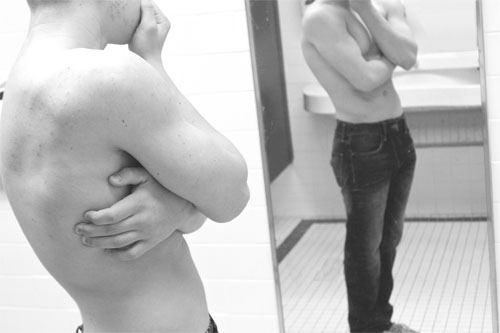For most teenagers, coping with insecurities is no foreign concept. However, according to an Oracle-conducted survey, some South students believe that there is a false assumption when it comes to body insecurities: that they only occur in women.
An Oracle-conducted survey revealed that of the 339 South students surveyed, 61 percent believe that only females experience body image issues. However, a male-only survey stated that more than half of the 105 males surveyed have experienced insecurities about their bodies.
South social worker David Hartman described that while children typically look towards their parents for guidance, teenagers usually turn outward to their peers and the media to shape their personalities and desired appearances.
Hartman believes that this external force can develop into body image problems due to the artificial representations in the media of what men and women are supposed to look like.
However, Hartman said that due to the fact that women and their bodies are more openly criticized in society, the insecurities that men feel sometimes go unnoticed.
“[Our society] objectifies women and girls much more [than guys],” Hartman said. “It’s different for men. We don’t really objectify them in the same way that we do girls.”
While they may not get equal attention, some South males have said they experience body image insecurities.
For junior Chris Fuchs, wrestling is a factor that brings on concerns about his body and his body image. Fuchs stated that the pressures to make his weight class consume him during season.
“Wrestling is definitely something that has caused a lot of problems with my weight,” Fuchs said. ”[During season], all I’m thinking about whenever I put food or water into my body is how the scale is going to go up.”
Fuchs said that he also believes that many people do not realize that males feel the same urge that many females do to have the “perfect body.”
“People don’t realize that a lot of guys feel the same pressures [that girls do] to be strong and to have the “perfect body” in society, but not everyone can be that way,” Fuchs said.
Fuchs described the media interpretation of the “perfect male” as a man who is toned, strong and muscularly built.
Junior Aaron Kahn agrees with the stereotype described and admits that he doesn’t believe he fits it. This feeling ultimately led Kahn to enroll in the Weights Training class at South, where he says he is trying to become stronger to improve his appearance and his health.
“I want to be at the same level of [my male peers],” Kahn said. “I don’t want to be the weakest one in every room or the scrawniest because that’s kind of awkward.”
Like Kahn, junior Aaron Ach recognizes that men, in addition to women, suffer from pressures to have a “perfect” body. Ach feels that the reason that some people don’t realize that men experience body image issues too is because men tend to be less vocal about them.
“I think every guy feels pressured [to look a certain way] at some point, especially if he looks in the mirror and sees that he has smaller arms than he wants or he doesn’t have the six pack that he sees on the cover of People Magazine,” Ach said. “Guys are just much more inward about it.”
Fuchs said he agrees that males tend to be more reserved about their bodies, attributing the lack of vocalization from males about their insecurities to the belief that concealing one’s feelings inside is the more manly thing to do.
“A lot of guys feel that speaking out about things like [their bodies] is a very feminine thing to do,” Fuchs said. “Guys don’t talk about that sort of thing, and it is a stigma.”
For Ach, acceptance is the key to overcoming the stereotypes and insecurities thrust upon both males and females in society.
“Body images are constantly evolving as I think they should, but I’m hoping that [society] will end up getting to the point where we’re much more accepting of different people and different builds and different physical appearances,” Ach said. “We just need to look past the way somebody appears.”










